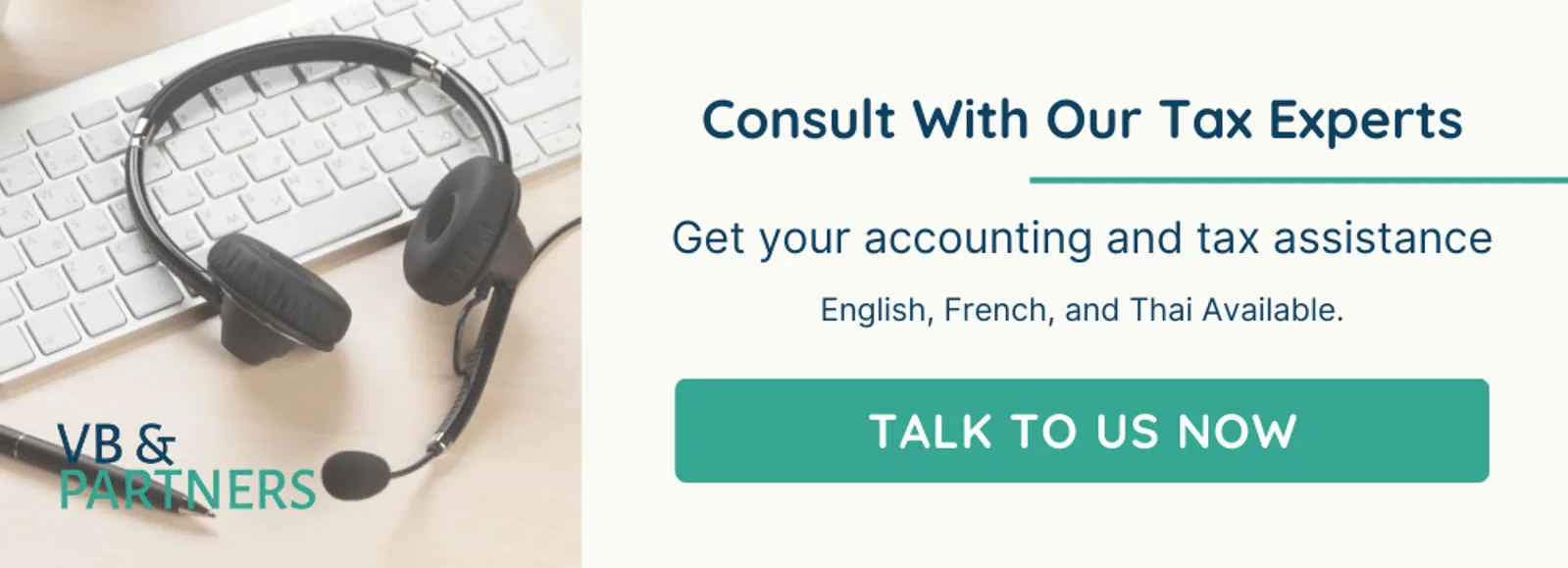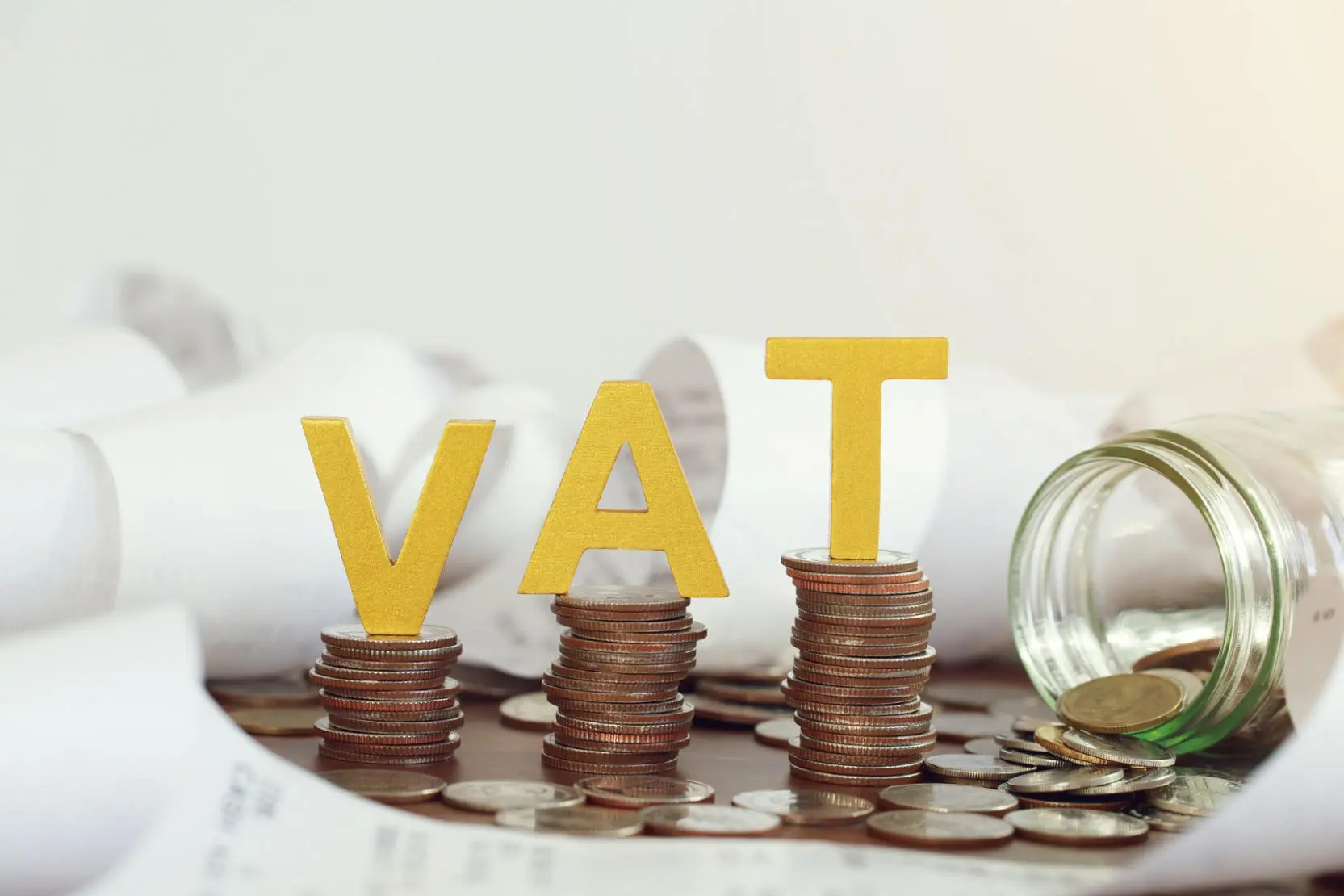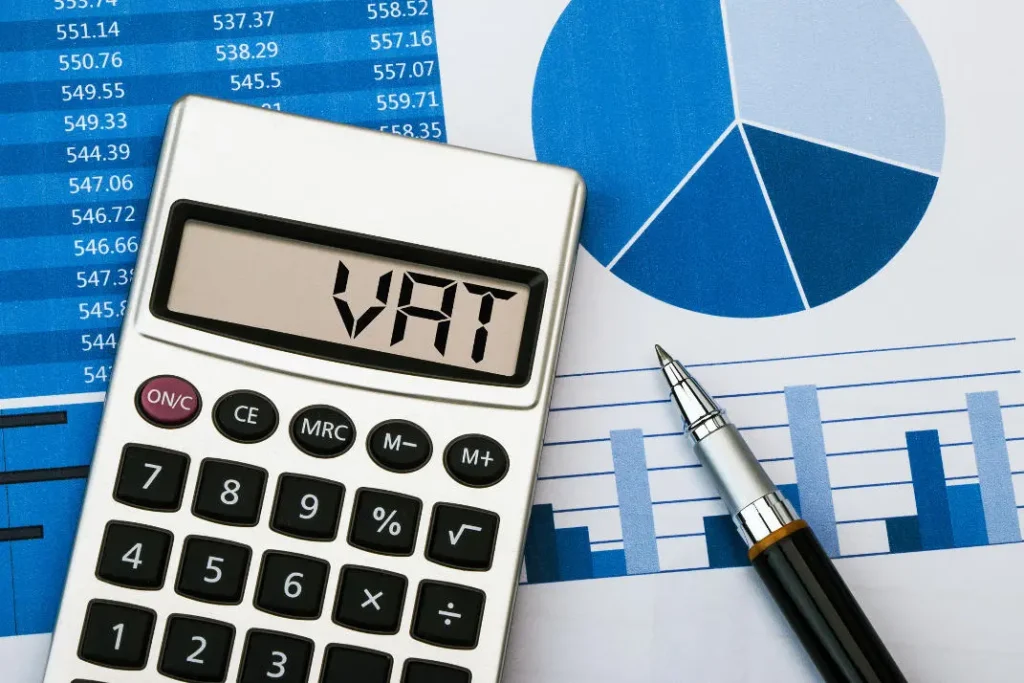While Thailand’s VAT system primarily applies to goods and services sold within the country, the Revenue Code states that VAT applies to certain sales outside of Thailand. While such services may be subject to VAT, the applicable rate is zero percent. However, VAT registration may still be required depending on the nature and scope of the business activities.
This is important because although these transactions are subjected to a 0% rate, they are not technically exempt from VAT. The Revenue Department also retains the rights to revise the applicable rate in the future.
Key Points
- The standard VAT rate in Thailand is 7%.
- Businesses with annual turnover exceeding 1.8 million Baht must register for VAT, while those below this threshold are not required to register, they cannot issue tax invoices or claim input VAT.
- Certain transactions qualify for 0% VAT rate, including exports, services performed in Thailand but used entirely abroad, and international transportation.
- To claim the 0% VAT rate, companies must provide documentation proving payment from outside Thailand, such as bank transfers, receipts,credit card records or shipment evidence for goods.
- Some business activities are completely exempt from VAT, including specific professional services, land transportation, educational services, and rental of immovable properties.
Understanding VAT in Thailand
VAT is applied to the value added to goods and services at each stage of production and distribution. The VAT rate in Thailand is legally set at 10% in the Revenue Code, but has been temporarily reduced to 7% through royal decrees since September 1997 following the Asian Financial Crisis. This reduced rate has been continuously extended and is currently valid until September 30, 2025. The VAT rate has been effectively maintained at 7% since 1997 to encourage economic growth.
However, certain goods and services may be exempt from VAT or subject to reduced rates. For example, exports and specific services rendered in Thailand but used abroad are zero-rated, meaning they are not subject to VAT charges.
Businesses operating in Thailand are required to register for VAT if their annual turnover exceeds 1.8 million baht. VAT registration is also mandatory for companies who wish to hire foreign employees.
Businesses with annual turnover below the 1.8 million Baht threshold are not required to register for VAT and may benefit from simplified accounting procedures as they are not obligated to file monthly VAT returns (PP.30) with the Revenue Department. Small businesses, holding companies, or companies primarily holding real estate assets frequently elect to remain non-VAT registered entities.
If your business anticipates generating revenue quickly and will incur VAT-applicable expenses during its initial establishment phase, it may be advantageous to register for VAT immediately upon company formation. This registration will enable the company to claim input VAT on business-related purchases, which can be credited against output VAT when filing monthly returns.

What are the VAT Rates in Thailand?
In Thailand, the Value Added Tax (VAT) system has a current rate of 7%, which applies to the majority of goods and services. This rate has been maintained since September 1997, following a temporary reduction from the statutory rate of 10% intended to encourage consumer spending and support economic growth.
The current reduced rate is set to remain in effect until at least September 30, 2025, as per the latest Royal Decree.
Zero-Rated Transactions
Certain transactions in Thailand are subject to a 0% VAT rate. The following categories are eligible for the zero-rate:
- Export of goods from Thailand
- Services performed in Thailand but utilized abroad.
- International transportation via aircraft or sea vessels
- Goods and services supplied to government agencies under foreign aid programs
- Goods and services provided to the United Nations and international organizations recognized under treaties
The Revenue Department uses the following criteria to determine whether a service qualifies for the zero VAT rate:
- The service must be performed in Thailand
- The service must be utilized entirely outside of Thailand
- The service must not have any direct connection to goods or property in Thailand
The Thai tax authorities apply a wide interpretation of VAT applicability, requiring that services performed in Thailand for foreign recipients must be used entirely outside of Thailand to qualify for the 0% VAT rate. Full supporting documentation must be maintained to ensure compliance in the event of an audit or review.
One important consideration that investors should be aware of is that all companies registered for VAT in Thailand must file monthly VAT returns, even for zero-rated transactions.
How Can Companies Claim the 0% VAT in Thailand?
To be able to claim the 0% VAT rate, companies must be able to demonstrate that the services were paid for from outside Thailand. This requires being able to provide documentation to prove this.
Examples of documentation that would be accepted to support a claim for a 0% VAT rate includes:
- a Letter of Credit (L/C),
- telegraphic transfer (T/T),
- term of payment (T/P) records,
- official receipts,
- bank statements confirming incoming transfers, or
- proof of payment via credit card, e-Money, or e-Cash platforms.
These documents must clearly reference the service invoice and identify the paying party as the foreign recipient.
If a company cannot provide the required supporting evidence, the transaction may be reclassified and subject to the standard VAT rate of 7%.
Read Also: How to Issue a Tax Invoice/Receipt in Thailand
Are any Business Activities Exempt from VAT in Thailand?
In addition to zero-rated transactions, certain goods and services are entirely exempt from VAT. Common exemptions include:
- The sale and import of specific products
- Professional services such as medical, audit, and regulated legal services
- Services provided by Thai governmental organizations
- Land transportation services
- Educational services provided by recognized schools
- Cultural services, such as those offered by libraries and museums
- Rent on immovable property such as real estate
- Religious and charitable services
- The purchase and import of raw gemstones (e.g. sapphires, rubies) by companies licensed to manufacture jewellery for export, provided the company is VAT-registered and the stones are used exclusively for export production.
Our Thoughts
Companies registered for VAT in Thailand must file monthly VAT returns even for zero-rated transactions. If applying the 0% VAT rate, consult with your accountant to confirm eligibility and maintain the proper supporting documentation.
Revenue Department audits are strict, and officials will not hesitate to reclassify transactions (apply the 7% rate to the transaction) if supporting documents are missing or if eligibility is questionable.
Another important consideration is that requesting reimbursement of accumulated VAT credits will likely trigger a Revenue Department audit, so its always recommended to ensure all documentation and procedures are properly in place before submitting such requests. Proper preparation and consultation with qualified tax professionals can help avoid costly compliance issues.
Looking for an Accounting firm in thailand? contact us for a consultation with one of our tax experts.
FAQs
Please see here for some FAQs relating to VAT in Thailand
What is the current VAT rate in Thailand?
The current VAT rate in Thailand is 7%, which has been temporarily reduced from the statutory rate of 10% since September 1997. This reduced rate has been extended until September 30, 2025, and may be further extended by the government.
Who must register for VAT in Thailand?
Any person or entity that supplies goods or services in Thailand with an annual turnover exceeding THB 1.8 million must register for VAT. The registration must be completed within 30 days after reaching this threshold. Companies that hire foreigners are also required to register for VAT as well.
Can I register for VAT voluntarily if my turnover is below 1.8 million baht?
Yes, businesses can register for VAT voluntarily even if their annual turnover is below the mandatory threshold. This allows them to issue tax invoices and claim input VAT credits on business purchases.
What is the 13-digit Tax ID Number (TIN)?
A Tax ID Number (TIN) is a unique 13-digit number that identifies a person or entity as being registered for VAT and other tax purposes in Thailand. This number is essential for VAT-registered businesses and can be verified on the Thai Revenue Department’s official website.
What transactions qualify for 0% VAT rate?
Key transactions eligible for zero-rated VAT include:
- Export of goods from Thailand
- Services performed in Thailand but utilized entirely abroad
- International transportation via aircraft or sea vessels
- Goods and services supplied to government agencies under foreign aid programs
- Goods and services provided to the United Nations and international organizations
How do I claim the 0% VAT rate?
To claim the 0% VAT rate, companies must provide documentation proving payment from outside Thailand, such as:
- Bank transfer records (telegraphic transfer)
- Letter of Credit (L/C)
- Official receipts showing foreign payment
- Credit card payment records from foreign sources
- Proof of shipment for exported goods
What’s the difference between 0% VAT and VAT exemption?
Zero-rated transactions are still subject to VAT but at a 0% rate, meaning businesses must still file VAT returns every month and can claim input VAT credits. VAT-exempt transactions are completely outside the VAT system, and businesses cannot claim input VAT credits on related expenses.
Where do I submit my VAT registration application?
Applications for VAT registration must be submitted to the Thai Area Revenue Offices if the business is based in Bangkok, or to the Area Revenue Branch Offices if located elsewhere in Thailand.
What documents are required for VAT registration?
Required documents typically include:
- Business registration certificate
- Director signatures and identification
- Proof of company headquarters/registered address
- Company financial projections
- Completed VAT registration form (PP.01)
How long does VAT registration take?
The typical VAT registration process takes approximately 4-6 days: 2 days for document collection, 2 days for preparation and signing, and additional time for filing with the Area Revenue department.
How often must I file VAT returns?
VAT returns must be filed monthly. The VAT taxable period is a calendar month, and returns must be submitted within 15 days of the following month.
What are the penalties for late VAT filing?
The Thai Revenue Department imposes fines of THB 300 within the first seven days of being late, and THB 500 after the first seven days. Penalties can also be issued of up to 200% of due taxes. A surcharge will also be applied monthly at a rate of 1.5% of the due taxes.
Do I need to file returns for zero-rated transactions?
Yes, companies registered for VAT must file monthly VAT returns even for zero-rated transactions. Proper documentation must be maintained to support the 0% rate claim.
Do foreign companies need to register for VAT in Thailand?
Foreign companies providing digital services to non-VAT registered customers in Thailand must register for VAT if their income exceeds THB 1.8 million per annum. Non-resident businesses must also register if they deliver goods in Thailand, install/assemble imports, or export goods from Thailand.
Read Also: Thailand Import Tax, What is Coming for 2026
What about B2B digital services to Thai businesses?
B2B sales of digital products to Thai businesses are subject to a reverse charge, meaning the Thai business customer accounts for the VAT rather than the foreign seller.
Can foreign companies get temporary VAT registration?
Yes, non-resident businesses may register for a temporary VAT number under Section 82/3 of the Revenue Code, without forming a local company, provided the registration remains open for 12 months and not more than three years.
Which goods and services are completely exempt from VAT?
Common VAT exemptions include:
- Basic groceries and essential food items
- Medical and healthcare services
- Educational services by recognized institutions
- Rental of immovable property (real estate)
- Land transportation services
- Religious and charitable services
- Certain professional services (medical, audit, legal)
- Cultural services (libraries, museums)
Are there any special exemptions for exporters?
Export of goods and services from Thailand generally qualify for VAT exemptions, provided exporters comply with applicable regulations and procedures for export documentation and customs clearance.
Can I claim input VAT refunds?
If input tax exceeds output tax, taxable persons can claim a VAT refund. Refunds can be paid in either cash or tax credits.
How long can I carry forward unused input VAT?
Any unused input tax can be credited against future output within the following six months.
Will requesting a VAT refund trigger an audit?
Requesting reimbursement of accumulated VAT credits will likely trigger a Revenue Department audit. Ensure all documentation and procedures are properly in place before submitting refund requests.
What records must I maintain?
VAT registered businesses must keep records of their sales and purchases of goods and services for five years and must produce all details when required by the Revenue Department.
What should I know about tax invoices?
VAT-registered businesses must issue tax invoices for transactions, which can be used to claim input tax credit. Invoices must detail the nature and value of goods/services, VAT amount due, supplier information, and date of issuance.
What happens if I can’t provide supporting documentation for 0% VAT?
If a company cannot provide the required supporting evidence for zero-rated transactions, then the transaction may be taxed at the standard 7% rate.
Disclaimer
This information is provided for general informational purposes only and is not legal, tax, or financial advice.





